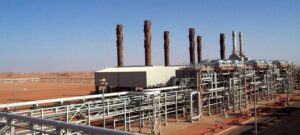 This article uncovers the vast potential present in Algeria’s energy sector, particularly in terms of gas exports and renewable energy.
This article uncovers the vast potential present in Algeria’s energy sector, particularly in terms of gas exports and renewable energy.
Country of Great Potential
Today, Minister of Economic Affairs Habeck is traveling to Algeria, from where a quarter of Europe’s natural gas originates. There is also potential for renewable energy. However, the human rights situation remains a problem. It is an interesting slip of the tongue: “Algeria hides great potential,” said political scientist Rachid Ouaissa recently to ARD. Ouaissa, who teaches at the University of Marburg, actually wanted to say that the largest country in Africa in terms of area holds many untapped opportunities.
But there is often the impression that the regime in Algiers, an opaque entity consisting of politicians, businessmen, and above all military personnel, also wants to hide something from the outside world.
Africa’s Largest Gas Exporter
Ouaissa has been studying the Maghreb states for years. When he speaks of potentials, he means the country’s large energy reserves. Whether fossil or renewable: “The country can be very important for the energy transition in Germany and Europe,” says Ouaissa.
Algeria is Africa’s largest gas exporter. After the Russian war of aggression against Ukraine, Algiers offered more gas deliveries, which Europe welcomed. Southern European countries such as Portugal, Spain, and Italy in particular benefited from this. However, the gas infrastructure is outdated.
So, the seemingly unlimited possibilities for renewable energy in the country remain. The German Ministry of Economic Affairs estimates Algeria’s solar energy potential to be one of the highest worldwide. And green hydrogen is also a topic. In October, Algerian representatives set the goal of supplying ten percent of Europe’s future demand.
“Possible Rapprochement”
Observers like Rachid Ouaissa hope that the transition from a fossil to a green economy will move the country forward. This is now possible because the 2019 elected President Abdelmadjid Tebboune has registered one foreign policy failure after another.
Disputes with France and Spain have been going on for some time, but above all, Algeria’s geopolitical influence is less than the claim Algiers makes. It does not play a special role in the Arab League and was not admitted to the BRICS states union, unlike Saudi Arabia and Iran.
Rapprochement is now possible – and thus also changes within Algeria, says Ouaissa. Robert Habeck should and must address sensitive issues such as the human rights situation during his visit, while simultaneously discussing topics such as export facilitation for Algerian industrial products on an equal footing. It sounds very much like the old German formula “change through trade”. However, it is known that this formula faced limits in Russia and China.
Deteriorated Human Rights Situation
According to the human rights activist Said Salhi, who fled to Belgium, the human rights situation has not improved after the nationwide Hirak protests, which prevented a re-election of longtime ruler Abd Al-Aziz Bouteflika in 2019. The expected change did not take place. Instead, there has been a “really alarming” setback in terms of rights and freedoms.
According to Amnesty International, around 200 people are currently imprisoned in Algeria for political reasons. The state is unyielding. In addition to human rights activists, particularly critical journalists are targeted, says Christopher Resch from Reporters Without Borders: “Journalists in Algeria have to deal with a political class that actively interferes in their work.”
Non-governmental organizations criticize that government-critical journalists have been arrested several times under sometimes absurd pretexts. For example, Ihsane El Kadi, who has been in custody since the end of last year. The justification: he supported organizations that threaten the state and security of Algeria. In reality, says Resch from Reporters Without Borders, the aim is to silence one of the last critical voices.
However, it is precisely here that political scientist Claus Leggewie sees the opportunity to outline a new German foreign policy. In an article for “Tagesspiegel,” Leggewie wrote that Habeck must make it clear that German economic delegations would only come if Ihsane El Kadi and other political prisoners were released.

